News
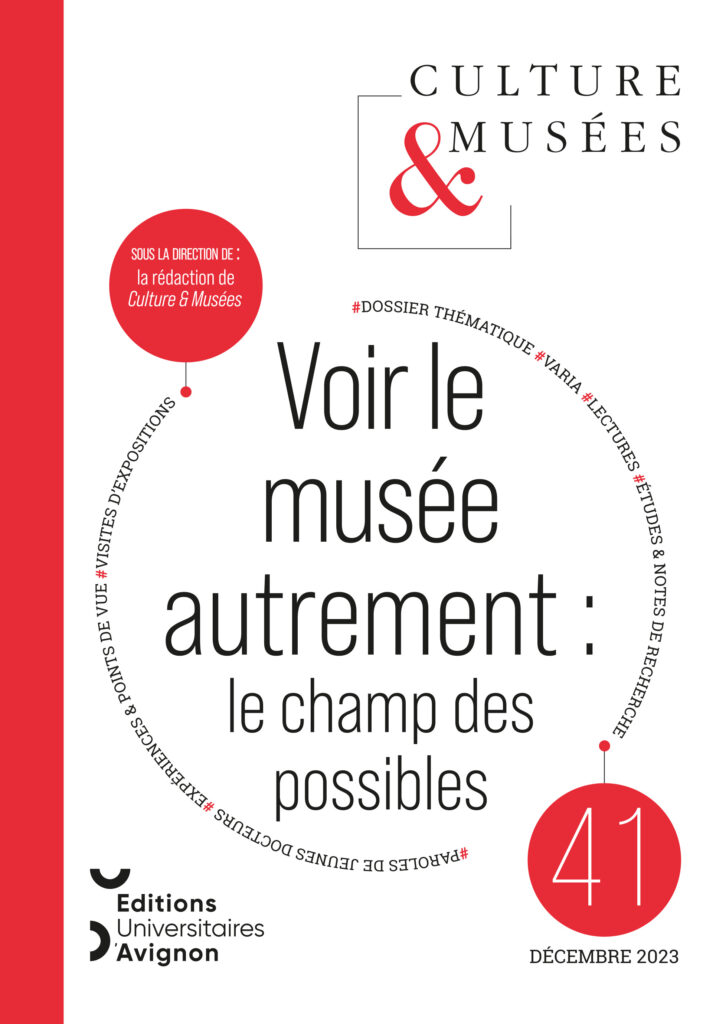
PUBLISHED ON 7 DECEMBER 2023
Magazines
294 pages
26 €
Print ISBN: 978-2-35768-170-5
Available on OpenEdition Journals : https://journals.openedition.org/culturemusees/9686
Information and extracts from the EUA research notebook : https://eua.hypotheses.org/17786
Culture & Museums | 41, Seeing museums differently: the fields of possibility
Culture & Museums
Culture & Musées magazine is back in print! This issue begins with a question about the future of museums, on the occasion of the magazine's thirtieth anniversary. After the major crisis experienced by cultural institutions during the covid-19 pandemic, the magazine is now back in print. Culture & Museums wanted to organise an open and constructive debate on the future of museums. It was part of a series of study days organised to mark the 30th anniversary of the founding of the museum.e anniversary of the journal, which were entitled "Seeing the museum differently: the field of possibilities". This anniversary issue draws on the discussions begun at the autumn 2021 conference. It takes a forward-looking approach to museology and the museum, drawing on a diversity of perspectives based on both research and practical experience. The special feature of this special issue is that it combines scientific articles with the viewpoints of professionals, encouraging a freer and more personal form of writing.
Under the direction of
Culture & Museumscreated in 2003, is a peer-reviewed scientific research journal that uses double-blind evaluation. It publishes original research on cultural audiences, institutions and mediation. It is aimed at researchers and students in these fields, as well as professionals working in museums and heritage.
With contributions from
P. Ancel, M. Atallah, P. Basu, M. Bertin, G. Black, F. Bodenstein, J. Botte, R. Chantraine, A. Chassagnol, N. Couillard, G. Crenn, J. Davallon, C. Dercon, F. van Geert, D. Jacobi, O. Lecuyer, L. Maggioni, F. Mairesse, C. Marie, A. Meunier, A. M. Navas Iannini, L. Renaud, F. Rigat, A. Semedo, É. Triquet, E. Pedretti, M.-S. Poli, D. Poulot and M. Viau-Courville.
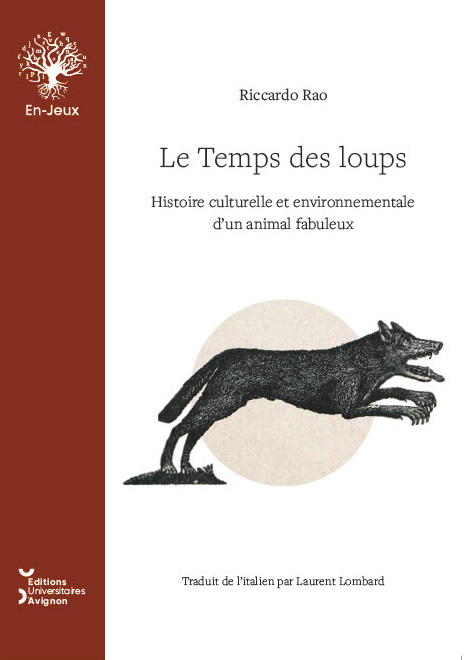
PUBLISHED ON 16 NOVEMBER 2023
Collection In-Games
322 pages
18 €
Print ISBN: 978-2-35768-167-5
Digital ISBN: 978-2-35768-168-2
Available on OpenEdition Books:
https://books.openedition.org/eua/7705
Information and extracts on the EUA research notebook : https://eua.hypotheses.org/16663
Time of the wolves: the cultural and environmental history of a fabulous animal
Riccardo Rao
The wolf, ferocious predator or fabulous animal, has been the talk of the town for centuries. By combining history with literature, psychology and biology, this book offers a threefold narrative on the figure of the wolf: a social history that invites us to reflect on its centuries-old coexistence with man; a cultural history that evokes multiple representations from Antiquity to the present day; and an ecological history that highlights its fundamental role in natural ecosystems.
This book puts into perspective some of the issues under debate today. Wolves are making a comeback across Europe, and old fears, never really allayed, are resurfacing.
The author
Professor of medieval history at the University of Bergamo (Italy), Riccardo Rao also teaches environmental and animal history. The author of various works on the Middle Ages, he has been a visiting researcher at a number of European and American institutions. The environment and the commons, animals and landscapes are now his favourite areas of research. Among his many works, we should mention the Spanish translation of this Time of the wolves (University of Cadiz, Editorial UCA, 2022), the recent I paesaggi dell'Italia medievale (Rome, Carocci, 2015) and the direction, with Simone Balossino, of the collective On the margins of the communal world: places of collective power and public palaces from the Alps to the Mediterranean (Ai margini del mondo communaleSesto Fiorentino, All'Insegna del Giglio, 2020).
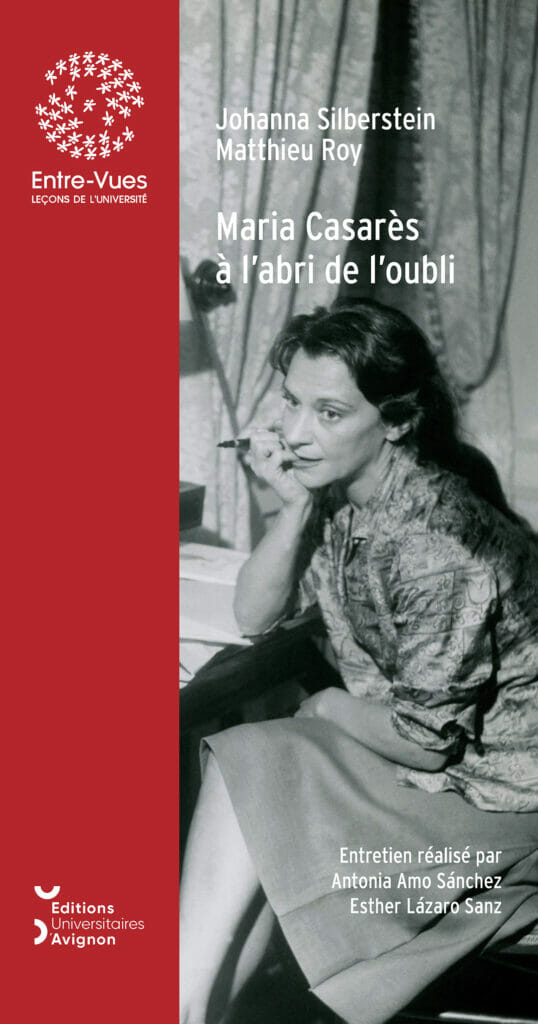
PUBLISHED ON 13 JULY 2023
Collection Viewing Room
80 pages
8 €
Print ISBN: 978-2-35768-165-1
Digital ISBN: 978-2-35768-166-8
Available on OpenEdition Books: https://books.openedition.org/eua/7638
Information and extracts on the EUA research notebook : https://eua.hypotheses.org/13029
Maria Casarès: safe from oblivion
Johanna Silberstein, Matthieu Roy
Interview by Antonia Amo Sánchez, Esther Lázaro Sanz
This interview focuses on one of the most famous figures in French theatre and cinema: Maria Casarès. Her career began during the Second World War and lasted until the year of her death. She is best known for her roles directed by Jean Genet, Koltès and Jean Vilar, director of the Théâtre national populaire. A fortnight before her death, Maria Casarès (1922-1996) decided to bequeath her estate at La Vergne to the commune of Alloue. Through this gesture, she wished to thank France for having been a land of asylum when she had to flee the Spanish Civil War with her family. However, she gave no indication of what she wanted to see come to life in her house. What kind of artistic and cultural project should be carried out in a "House of the Illustrious"? How best to preserve the memory of a committed theatre actress while meeting the needs of contemporary creation? This book traces the link between the Franco-Spanish artist and her place of residence, and the various stages that led to the creation of this cultural centre, now a benchmark for contemporary theatrical creation.
Under the direction of
Antonia Amo SánchezShe is a professor of Hispanic literature and theatre studies at the University of Avignon.
Esther Lazaro SánzShe has a doctorate in Spanish literature and specialises in the literature of exile and contemporary theatre.
In conversation with
Graduated as an actress from the École départementale de théâtre de l'Essonne (EDT91), Johanna Silberstein obtained a DEA from the Institut d'études théâtrales de Paris III. With the Veilleur® theatre company, she has performed under the direction of Matthieu Roy in a number of shows, including Marital love by Moravia, Prodiges® by Mariette Navarro, Martyr by Mayenburg, Europe connection by Alexandra Badea and Tartuffe by Molière. In 2013, she starred in the English version of Prodiges®at the Edinburgh Fringe Festival, and was nominated, along with the rest of the cast, by the trade journal The Stage. Johanna Silberstein runs a number of introductory and awareness-raising workshops. Between 2015 and 2018, she was an associate professional in the performing arts at Poitiers University. Since 2017, she has co-directed La Maison Maria Casarès with Matthieu Roy, as well as the company Veilleur®. In 2021, she was made a Chevalier dans l'Ordre des Arts et des Lettres.
Graduated from the National Theatre School in Strasbourg in the directing section, Matthieu Roy founded the Veilleur® company in Poitiers in 2007. He works mainly on the creation of unpublished texts by living authors for all audiences and young audiences: Christophe Pellet, Mariette Navarro, Gustave Akakpo, Marius 76 Présentation des auteurs von Mayenburg, Fabrice Melquiot, Alexandra Badea, Aiat Fayez, Mihaela Michailov, Sylvain Levey, Sophie Merceron... In 2014, he presented Even knights fall into oblivion by Gustave Akakpo at the Festival d'Avignon. In 2016, he created Europe connectionby Alexandra Badea at the Taipei Arts Festival. Matthieu Roy is a regular contributor to schools and vocational training courses, and was a member of the jury for the ARTCENA Grand Prix for dramatic literature. He directed the storyteller Yannick Jaulin in Like emptying the sea with a spoonand Pinocchioa musical composed by Lucia Ronchetti for the Opéra de Rouen Normandie and the Ensemble intercontemporain. Since 2017, Matthieu Roy has been co-director of La Maison Maria Casarès in Alloue with Johanna Silberstein. He was made a Chevalier dans l'Ordre des Arts et des Lettres in 2021.
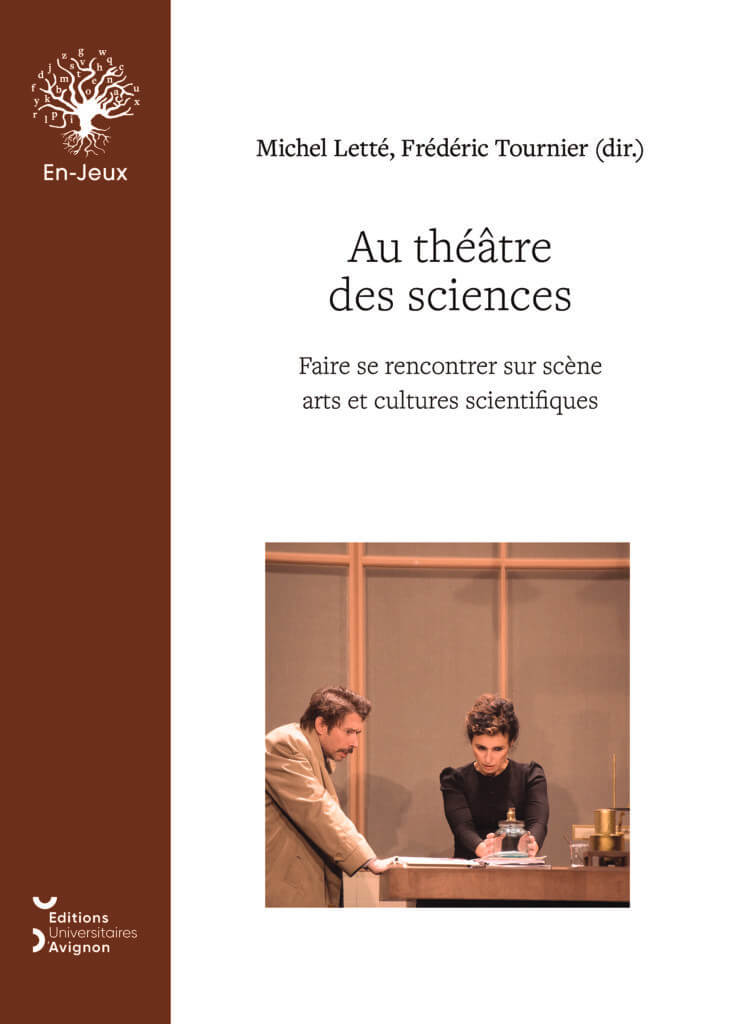
PUBLISHED ON 22 JUNE 2023
Collection In-Games
512 pages
29€
Print ISBN: 978-2-35768-163-7
Digital ISBN: 978-2-35768-164-4
Available on OpenEdition Books: https://books.openedition.org/eua/7411
Information and extracts from the EUA research notebook : https://eua.hypotheses.org/13021
At the theatre of science: bringing the arts and scientific culture together on stage
Michel Letté, Frédéric Tournier (eds.)
Theatre and science have gone hand in hand, from ancient times to the plays that have won the Molières. But in practice, how do you bring science and theatre together on stage?
In recent years, theatrical creations dedicated to the sciences have proliferated in a variety of forms. Innovative projects such as Binôme and Performing Research have emerged, combining theatre and science. They are generating new interest among audiences, artists, cultural and scientific institutions, and are supported by French public policy.
The aim of this book is to demonstrate the specific nature of stage exploration of the worlds of science, while making the challenges of research accessible to all types of audience. Through a variety of experiments, from Laos to Avignon, this polyphonic book gives a voice to the men and women of the stage as well as to a number of academics around a vision of the world of science.
of science theatre.
This book opens the door to the discovery of surprising creative synergies between scientists and theatre professionals.
Under the direction of
Senior lecturer in contemporary history at the Conservatoire national des arts et métiers (CNAM) in Paris, Michel Letté is in charge of professional training in the mediation of science and technology through cultural design. In this context, he has designed, produced and run a number of mediation systems, including those using the theatre stage (collective creation, science fiction scenes, Performing research). His current research focuses mainly on the history of sociotechnical controversies as an informal means of mediating relations between science, technology and society.
Trained as a biologist, Frédéric Tournier Between 1994 and 2005, he led a research team in cell biology, and in 2002 he was awarded a habilitation to direct research (HDR). In 2008, he joined the 'Sciences & Media' team at Paris-Diderot University (now Université Paris-Cité), where he successively took on a number of university missions: head of high school relations, delegate and then vice-president in charge of student life between 2010 and 2013. He began training as an actor in 2002 and has performed in a dozen plays from the repertoire between 2003 and 2019. For the past fifteen years, he has been leading the introductory workshop on scientific controversies in the "Audiovisual, journalism and scientific communication" master's programme, for which he is also responsible. He is currently conducting cross-disciplinary research into the theatre of science and the history of French maritime research stations.
With contributions from
Claire Barel-Moisan, Élisabeth Bouchaud, Sylvie Bouchet, Coline Bouvarel, Laurent Contamin, Olivier Fournout, Pascale Hancart Petitet, Mathieu Huot, Georgia Kanellopoulou, Thiane Khamvongsa, Guillaume Laigle, Pauline Landel, Guillaume Mika, Robert Nardone, Daniel Raichvarg, Thibault Rossigneux, Anne Rougée, Damien Schoëvaërt-Brossault, Jean-François Toulouse, Émilie Trasente and Michel Valmer.
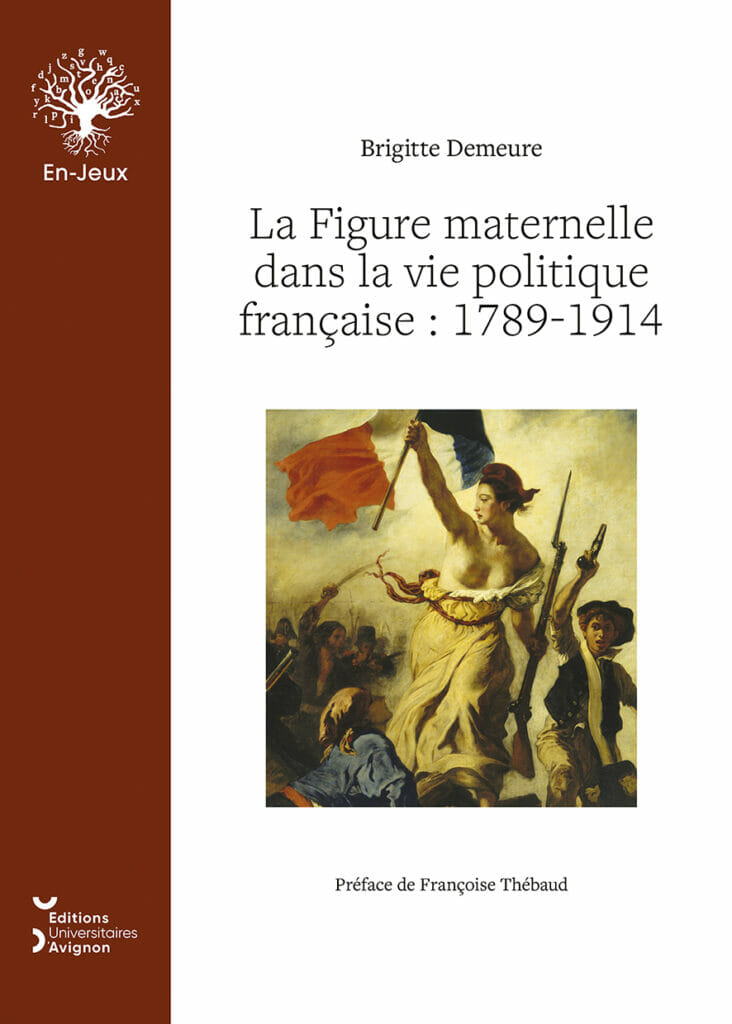
PUBLISHED ON 25 MAY 2023
Collection In-Games
432 pages
29 €
Print ISBN: 978-2-35768-161-3
Digital ISBN: 978-2-35768-162-0
Available on OpenEdition Books: https://books.openedition.org/eua/7311
Information and extracts from the EUA research notebook : https://eua.hypotheses.org/12361
The mother figure in French politics: 1789-1914
Brigitte Demeure
From 1789 to the First World War, the mother figure, in the form of allegories or metaphors, was central to political discourse. The representation of the mother - Patrie, Vierge, Nation - and her sons in France helped to construct national narratives that often competed with one another, from Robespierre to Auguste Comte, from Napoleon to Jules Ferry.
The use of these maternal images, which comes under the heading of "believing" or "making believe", legitimises the values that permeate the institutions and has obvious consequences for the social bond.
The aim is to identify, from one period to the next, the connections developed through discourse around the representation of the mother. The breadth of the sources and the quality of the analyses presented highlight a number of new historical and interdisciplinary perspectives, with psychoanalysis constituting the 'shadow framework' of this research.
This fascinating study offers an innovative rereading of the mental worlds of the revolutionary period and its long nineteenth century.
The author
After spending many years abroad, Brigitte Demeure moved to the Vaucluse region of France, where she worked as an export manager and lecturer in Germanic Studies at the University of Avignon, while at the same time working in humanitarian associations. She then resumed her studies and now holds a Master 2 in Intercultural Negotiation and a PhD in History, obtained in 2017. She works as a consultant for an international federation of public purchasers committed to improving working conditions in their electronics supply chains. She has co-organised and taken part in numerous symposia on psychohistory, history and psychoanalysis in Germany, the United States and France. She has received two ACOPSA awards (American College of Psychoanalysts): the Henry P. and M. Page Laughlin Clinical Research Award the Distinguished Citizen Award for her International Outstanding Contributions to Psychoanalysis and the Public Well-Being (2014).
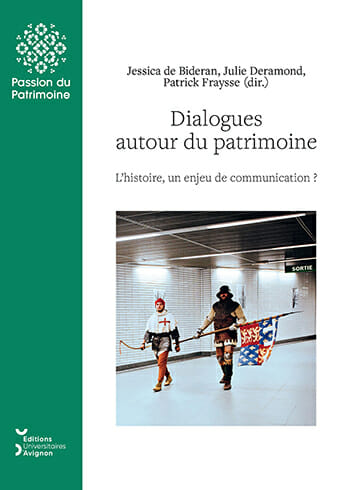
TO BE RELEASED ON 20 APRIL 2023
Collection Passion for heritage
376 pages
33 €
Printed ISBN: 978-2-35768-159-0
Digital ISBN: 978-2-35768-160-6
Available on OpenEdition Books : https://books.openedition.org/eua/7033
Presentation and extracts on the EUA research notebook :https://eua.hypotheses.org/12096
Dialogues around heritage: history as a communication issue?
Jessica de Bideran, Julie Deramond, Patrick Fraysse (dir.)
This book condenses the history of a beautiful adventure that has been going on for ten years. Most of the various contributions were made on the internet, in the Com'en histoire research notebook created in 2013.
The aim is to bring together researchers specialising in the humanities and social sciences and professionals working in the museum and heritage world.
Heritage is considered here at the intersection of historical and communicational approaches, creating a dialogue that the contributors of the book hope will be fruitful, on various themes, such as the narration and telling of history, the use and reception of historical reconstructions, or the new forms of museum mediation and the circulation of history in the public space.
The texts, sources and bibliographical references have been updated to make this book fully up-to-date and useful for professionals, academics, students and all interested parties.
Under the direction of
After training in art history, Jessica de Bideran is currently a lecturer in information and communication sciences at Bordeaux-Montaigne University and a researcher at MICA (Médiations, Informations, Communications, Arts). Her latest work focuses on the study of the process of making written and documentary heritage part of our heritage, and the impact of digital technology on the mediation and mediatisation of these resources.
PhD in contemporary history, Julie Deramond is a lecturer in information and communication sciences at Avignon University and a member of the Centre Norbert Elias. Her research focuses on the links between heritage and food, forms of communication and mediation of history, and sensory and artistic mediation. Since January 2022, she has also been deputy director of Éditions universitaires d'Avignon.
Patrick Fraysse is a professor of information and communication sciences at the University of Toulouse III-Paul-Sabatier and a researcher at the Laboratoire d'Études et de Recherches Appliquées en Sciences Sociales (LERASS), where he co-leads the "Heritage and Mediation" research group. His research focuses on observing and analysing mediation systems in museums and other cultural venues, and how they are used by the public.
With contributions from
M. Bourdaa, E. Cavalié, R. Cazals, J. Davallon, M. Fontaine, F. Henryot, J. Golonka, M. Labat, T. Le Hégarat, Y. Lintz, L. Macé, S. Madeleine, M. Molinier, J.-A. Pigearias, M.-S. Poli, G. Régimbeau, M.-C. Régnier, C. Saillard, C. Salvetat, J.-F. Sibers, A. Tuaillon Demésy, A. Vigouroux, X. Villebrun, M.-P. Vitali.
Mis à jour le 13 December 2023